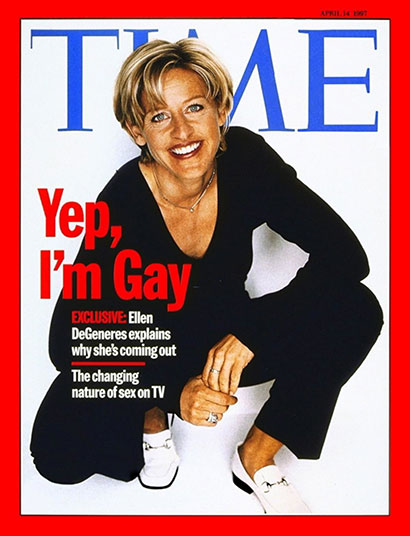How we’ve grown. Ellen celebrates 20 years since coming out on TV
 The powerful impact of Ellen DeGeneres’ coming out on American television 20 years ago is still being felt today.
The powerful impact of Ellen DeGeneres’ coming out on American television 20 years ago is still being felt today.
It was on 30 April, 1997 when DeGeneres’ sitcom character, Ellen Morgan, came out on the popular show. DeGeneres herself had come out just days earlier on the cover of Time magazine.
The pivotal episode was named The Puppy Episode because when DeGeneres had earlier suggested a love story between her character and another woman to one of the producers, the skeptical executive replied that she should “get a puppy” instead.
The episode featured several stars including Oprah Winfrey, who played Ellen’s therapist, Demi Moore, Billy Bob Thornton, k.d. lang, Melissa Etheridge and Laura Dern, as the love interest.
It was the first time a lead character in an American television show had come out. The media hype around the episode saw people holding ‘coming out’ house parties around the country during its broadcast.
The Puppy Episode was watched by 42 million people and won a number of awards. But thereafter, the series’ popularity dwindled following an anti-gay backlash and it was cancelled in May 1998.
DeGeneres’ career also suffered a major slump and she only successfully returned to television in 2003 with The Ellen DeGeneres Show, the still popular daytime talk show.
On Friday, DeGeneres dedicated an entire episode of her show to The Puppy Episode. The cast, including Winfrey, reunited on stage and former first lady Michelle Obama appeared in a taped message to applaud the comedian.
“Ellen, congratulations on the 20th anniversary of announcing to the world who you really are,” Obama said. “Time and again you have shown us what love really means. You are brave, you are kind… I absolutely adore you.”
Winfrey told DeGeneres that she agreed to appear in The Puppy Episode because “I so believed in your truth and I so wanted to support you”. She also revealed that she received a huge amount of racist and homophobic hate mail for doing so.
 DeGeneres herself recalled that she received “a lot of death threats” after coming out and that there had even been a bomb scare while making the episode.
DeGeneres herself recalled that she received “a lot of death threats” after coming out and that there had even been a bomb scare while making the episode.
“It was surprising how many people I upset. I was a comedian, I was funny and I also happened to be gay and I just got tired of hiding it. And I thought, well, nothing’s going to change; I’m still funny, I’m still the same person.”
DeGeneres was also treated to an emotional video in which some of her fans opened up about how their lives were changed by her coming out back in 1997.
In a statement, the Human Rights Campaign congratulated DeGeneres for her “courageous decision to live openly and honestly – both on and off screen,” calling it “truly historic”.
GLAAD, the LGBTQ media advocacy group noted that since Ellen, “there has been tremendous progress made in LGBTQ representation on television. From teen witches to hardened criminals to regular teens to animated gems, LGBTQ characters on our screens have increased exponentially since 1997.”
It added: “Progress is constantly ongoing, and there is still a long way to go to ensure the meaningful inclusion of underrepresented communities, but if this is how much can change in just two decades, think of where we could be twenty years from now.”
Leave a Reply